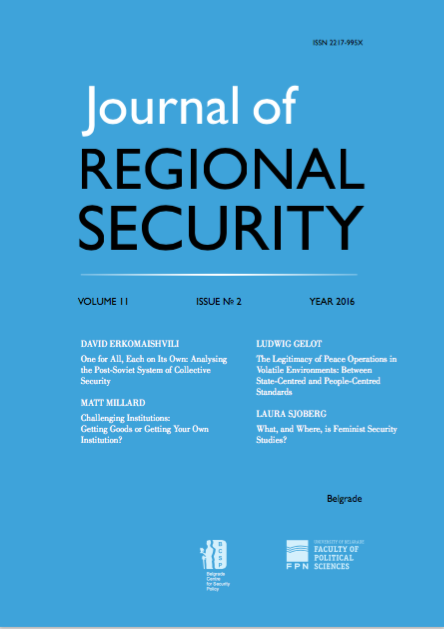Challenging Institutions: Getting Goods or Getting Your Own Institution?
Abstract
I present a discussion of the current state of liberal internationalism as it relates to international organisations. I maintain that the literature focuses too much on liberal interna- tionalism instead of non-liberal internationalism. This is problematic because non-liberal states are increasingly becoming important players in the international system, as is the case with Rus- sia and China. I argue that non-liberal states have a variety of approaches in their dealings with international institutions that can enable them to maximise their net gains from institutions. These are: 1) keep using the liberal institution, 2) utilise institutional àla cartism (forum shop- ping), 3) create an anti-liberal institution, or 4) opt out of institutions alltogether. Scholars and practitioners alike should acknowledge that international institutions can be a vehicle whereby non-liberal states maximise their power and diminish the power and influence of liberal states.
References
Abbott, Kenneth W., and Duncan Snidal. 1998. “Why states act through formal inter- national organizations.” Journal of conflict resolution 42 (1): 3–32.
Aggarwal, Vinod K. 1998. “Reconciling multiple institutions: Bargaining, linkages, and nesting.” Institutional designs for a complex world: Bargaining, linkages, and nesting: 1–31.
Alter, Karen J., and Sophie Meunier. 2006. “Nested and overlapping regimes in the transatlantic banana trade dispute.” Journal of European Public Policy 13 (3): 362– 382.
Betts, Alexander. 2013. “Regime complexity and international organizations: UN- HCR as a challenged institution.” Global Governance: A Review of Multilateralism and International Organizations 19 (1): 69–81.
Bugajski, Janusz. 2010. “Russia’s pragmatic reimperialization.” Caucasian Review of International Affairs 4 (1): 3−19.
Busch, Marc L. 2007. “Overlapping institutions, forum shopping, and dispute settle- ment in international trade.” International Organization 61 (4): 735–761.
Ferdinand, Peter. 2013. “The positions of Russia and China at the UN Security Council in the light of recent crises.” Briefing Paper, Policy Department, Directorate- General for External Policies of the European Union, March: 10.
Grant, Charles. 2009. “Can Russia Contribute to Global Governance?” Centre for External Policies of the European Union, June. http://www.cer.org.uk/insights/can- russia-contribute-global-governance.
Jupille, Joseph, and Duncan Snidal. 2005. “The choice of international institutions: Cooperation, alternatives and strategies.” In American Political Science Association annual meeting, Washington, DC.
Keohane, Robert O., and Joseph S. Nye. 1977. Power and interdependence: World politics in transition (2nd ed., pp. 27–29). Boston: Little, Brown.
Keohane, Robert O. 1989. “International institutions: two approaches.” In Macht und Ohnmacht politischer Institutionen, edited by Hans-Hermann Hartwich, 285−305. Opladen: VS Verlag für Sozialwissenschaften.
Koremenos, B., C. Lipson, and D. Snidal. 2001. “The rational design of international institutions.” International Organization, 55(4): 761–799.
Leeds, B. A. 2000. “Credible commitments and international cooperation: Guaran- teeing contracts without external enforcement.” Conflict Management and Peace Science, 18 (1): 49–71.
Mitrany, D. 1933. The progress of international government. New Haven: Yale Univer- sity Press.
Volgy, Thomas J., Derrick V. Frazier, and Robert Stewart Ingersoll. 2003. “Preference similarities and group hegemony: G-7 voting cohesion in the UN General Assembly.” Journal of International Relations and Development 6 (1): 51–70.
Authors retain copyright of the published papers and grant to the publisher the non-exclusive right to publish the article, to be cited as its original publisher in case of reuse, and to distribute it in all forms and media.
The published articles will be distributed under the Creative Commons Attribution 4.0 International License (CC BY). It is allowed to copy and redistribute the material in any medium or format, and remix, transform, and build upon it for any purpose, even commercially, as long as appropriate credit is given to the original author(s), a link to the license is provided and it is indicated if changes were made. / The published articles will be distributed under the Creative Commons Attribution ShareAlike 4.0 International license (CC BY-SA). It is allowed to copy and redistribute the material in any medium or format, and remix, transform, and build upon it for any purpose, even commercially, as long as appropriate credit is given to the original author(s), a link to the license is provided, it is indicated if changes were made and the new work is distributed under the same license as the original.
Users are required to provide full bibliographic description of the original publication (authors, article title, journal title, volume, issue, pages), as well as its DOI code. In electronic publishing, users are also required to link the content with both the original article published in Journal of Regional Security and the licence used.
Authors are able to enter into separate, additional contractual arrangements for the non-exclusive distribution of the journal's published version of the work (e.g., post it to an institutional repository or publish it in a book), with an acknowledgement of its initial publication in this journal.
Authors are permitted to deposit author’s pre-print / author’s post-print (accepted version) / publisher's version (PDF) of their work in an institutional repository, subject-based repository, author's personal website (including social networking sites, such as ResearchGate, Academia.edu, etc.), and/or departmental website prior or during the submission process / at any time after the acceptance of the manuscript / at any time after publication.
Full bibliographic information (authors, article title, journal title, volume, issue, pages) about the original publication must be provided and links must be made to the article's DOI and the license.

